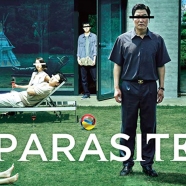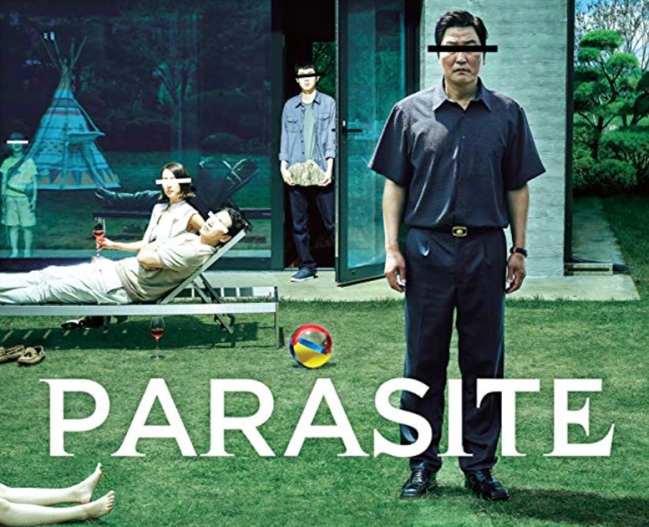 September
17
September
17
Tags
Parasite (2019)

There is no shortage of films that depict the injustice of social inequality but originality is scarce. With a large proportion of its population below the poverty line, it is noteworthy that a filmmaker from South Korea has produced a work that has attracted almost universal acclaim. Parasite (2019)generates a great deal of conversation but be warned: it is not a film for everyone, especially those averse to gory endings.
If you step back from the story’s twists and turns, the narrative premise is simple. A family of petty crooks living in abject poverty get lucky as, one by one, each tricks their way into being employed by the same heartlessly wealthy family in roles like tutor, driver, and housekeeper. The gullible family is easy to deceive, while the crooks manufacture various scenarios to their own advantage. The occupation of the luxurious home by the crooks adds a new meaning to the concept of home invasion. However, the plan comes un-stuck when they find a secret dungeon that leads to horrific consequences.
The film takes too much time in developing the central premise and various sub-plots, and more descriptive prose could be offered here about what actually happens. But that is not the point of the film. Director Joon-ho Bong paints an intricate portrait of the normalisation of poverty and class privilege, with both sets of family never questioning their place in South Korea’s social order. This acceptance and its destructiveness of the human spirit makes change impossible and condemns Korean society to moral bankruptcy.
There is more to this film than political discourse. As a black comedy, it is sprinkled with funny although improbable moments and the filming style expresses the polemic in obvious ways. Juxtaposing the world occupied by a smelly cramped underclass with the opulent world of the rich is low-hanging fruit. One can also find elements of magical fantasy, as it requires an unequivocal suspension of disbelief to accept that a family of losers can so easily dupe a family of high achievers. The acting tends towards wooden, and it is difficult to warm to any particular character. The film’s climax offers little other than an ambivalent balance between hope and nihilism, leaving viewers to decide which family are the parasites.
For many, the critical pendulum swings towards the ‘masterpiece’ label. But it is perhaps closer to reality to describe this as an original, engaging, and disturbing tale of endemic class tension, oppression, and helplessness. Although tenuous, the message has universal relevance.

Director: Joon-ho Bong
Stars: Kang-ho Song, Sun-kyun Lee, Yeo-jeong Jo

What an interesting review. I haven’t heard of this one, but then, I’ve been out of the country and woefully busy lately, so not paying attention. The one might need my attention.
LikeLiked by 1 person
A very interesting film Linda; nice to see you back on deck.
LikeLiked by 1 person
Perhaps I should qualify my response to the film ‘Parasite’ by saying I liked the good half very much. I thought it was witty and insightful in its depiction of Sth Korean society. The humour amazed me by how accessible it was for a western audience. Australians would see its humour as ‘funny’.
The film lost me when it degenerated into the horror genre. By the end sequences the ‘horror’ element had become farce. I didn’t like that at all and wondered why director Joon -Ho Bong let an admirable film slip through his fingers this way. Maybe he felt that he had nowhere else to go?
I loved your review Richard. It would rank as one of your best. Thanks.
LikeLiked by 1 person
Your observation that the director “had nowhere else to go” is astute. Its a commonly-used escape route for many directors who paint extreme despair into a corner and must use one of the magical fantasy sub-genres to find expression.
LikeLike
Black comedy aside, the final message seems to suggest the poor is unable to climb out of poverty on their own without external help (the son’s friend making the first introduction). And despite their own ingenuity (which may be illegal involving forgery and misrepresentation), they will remain trapped and invisible. Bong Joon-ho’s most pessimistic film.
LikeLiked by 2 people
An astute summary, thank you.
LikeLike
Pingback: Parasite: Movie Review
I finally got around to watching this film, which actually took America by storm last fall. I resist watching it at the theatre because I was sure I wouldn’t like it, despite all the accolades it accrued.
Watching the DVD, I was pleasantly surprised by the clever approach to an old trope of the haves and the have nots. And yes, I agree that it devolved into the ludicrous in the second half. Yet still, the ludicrous parts were cleverly executed. Something I couldn’t figure out was the scene of the parasite fogger coming down the street and blasting the open windows of the poor family (who purposely kept the windows open to get rid of the stink bugs.) I mean, I get the irony and all, but since that went nowhere in the film, and took quite a bit of time, it seemed a bit like a message in all caps.
LikeLiked by 2 people
Thanks for your interesting observations Rangewriter. I still cannot understand how it won Best Picture and can only presume diversity politics played a disproportionate part in the Academy.
LikeLiked by 1 person